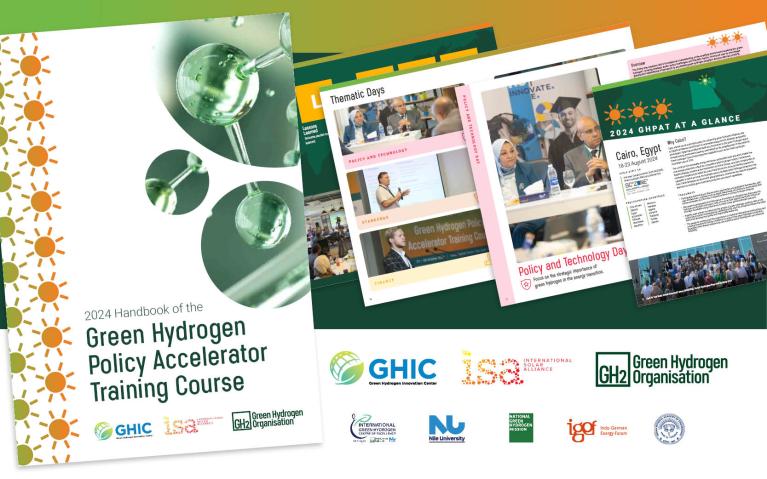2024 Handbook of the Green Hydrogen Policy Accelerator Training Course

Read the 2024 Handbook
This handbook was created with funding support from the International Solar Alliance (ISA) provided to the Green Hydrogen Organisation (GH2) for the implementation of the 2024 Green Hydrogen Policy Accelerator Training Course.
The 2024 Green Hydrogen Policy Accelerator Training Course (GHPAT) marked a pivotal step in advancing global cooperation for green hydrogen policy development. This handbook summarises key insights and lessons from the comprehensive training conducted in Cairo, Egypt, and New Delhi, India. Jointly organised by the International Solar Alliance (ISA) and the Green Hydrogen Organisation (GH2), the sessions hosted 80 participants from 27 countries.
The training aimed to equip policymakers and stakeholders from emerging markets with the expertise and resources needed to develop scalable green hydrogen policies aligned with international sustainability goals and energy transition frameworks.
Spanning multiple thematic days, the programme addressed critical areas of green hydrogen development, including policy, technology, standards, finance, trade, infrastructure, and industry insights. Each day featured targeted sessions fostering in-depth discussions and knowledge sharing.
Thematic Highlights
- Policy and Technology Day: Explored strategic frameworks for scaling green hydrogen, focusing on policy challenges and enabling environments.
- Standards Day: Led by Dr. Sam Bartlett, this session emphasised the importance of robust certification and regional alignment for credibility and seamless trade.
- Finance Day: Expert-led sessions, including insights from Maarten van der Vlies, tackled financial challenges, innovative investment structures, and the role of Development Finance Institutions (DFIs) in risk mitigation.
- Trade and Infrastructure Day: Included strategic discussions on global market access, EU regulatory standards, and sustainable land and water management.
- Industry Day: Highlighted practical applications of green hydrogen in off-grid and isolated regions, showcasing distributed power models and specific use cases.
- Field Visits and Heritage Trips: Featured on-site experiences at the Suez Canal Economic Zone (SCZONE) in Cairo and NTPC’s green hydrogen facilities in New Delhi, providing participants with first-hand exposure to operational projects and local cultural heritage, including visits to the Pyramids of Giza and the Red Fort.
The GHPAT course highlighted the varied levels of policy maturity among participating nations. While countries like Egypt and India demonstrated multi-level strategies, emerging nations concentrated on foundational renewable energy policies. The course underscored the importance of tailored approaches that prioritise local energy security and integrate social and environmental safeguards.
Key Outcomes
- Enhanced Policy Understanding: Participants gained a comprehensive understanding of green hydrogen fundamentals, policy design, and regulatory mechanisms, including hydrogen production, storage, and transport technologies. Discussions focused on promoting green hydrogen as an alternative fuel for industries such as steel, cement, and transportation.
- Regional Focus and Customisation: In Cairo, sessions focused on incorporating green hydrogen into Middle Eastern and North African (MENA) energy strategies, leveraging the region’s solar and wind potential. In New Delhi, discussions addressed India’s unique challenges, such as scaling renewable energy capacity and reducing infrastructure costs.
- Framework for Investment and Partnerships: Both sessions facilitated dialogue on creating an investment-friendly ecosystem to attract domestic and international capital. Participants examined case studies of successful projects and explored partnerships between governments, industry, and academia.
Strategic Outcomes and Path Forward Participants gained practical tools, such as the P.O.L.I.C.Y. framework, to guide national strategies. The course fostered a collaborative network ready to drive green hydrogen adoption and address challenges like financing, certification, and energy resource management. The 2024 GHPAT sets a strong precedent for future global policy accelerator programmes.
The GHPAT represents significant progress in supporting emerging economies as they navigate the green hydrogen landscape. By building a strong policy foundation, the ISA and GH2 are promoting a collaborative environment for sustainable energy advancement. This initiative will continue to expand globally, developing tailored policies to meet diverse regional needs and contribute to carbon reduction goals.